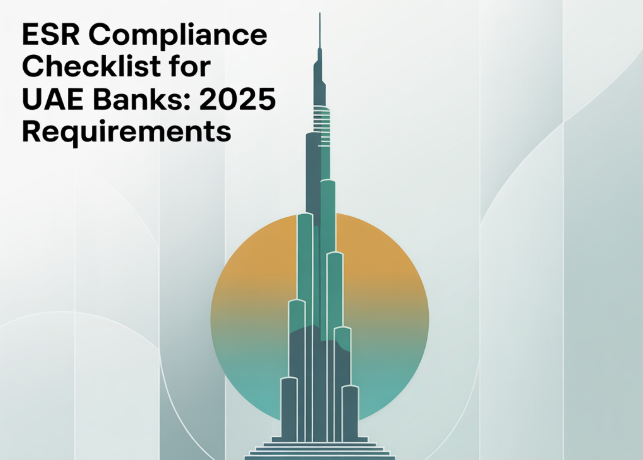Introduction: Navigating ESR Compliance in 2025
The Economic Substance Regulations (ESR) represent a pivotal compliance framework for UAE-based businesses, especially in the banking sector. As the UAE continues to strengthen its regulatory alignment with global standards, adherence to ESR has become non-negotiable. For banks operating in the region, understanding and fulfilling the 2025 ESR requirements is not only essential for legal compliance but also vital for maintaining investor confidence and operational transparency.
Understanding the Economic Substance Regulations (ESR)
ESR was introduced to ensure that UAE-registered entities report actual economic activity and substance in the jurisdiction. Its primary purpose is to combat tax evasion and harmful tax practices by mandating that entities conducting certain ‘Relevant Activities’ maintain a substantial presence in the UAE. For banks, this means a close review of business models to demonstrate genuine substance and value generation.
Applicability of ESR to UAE Banks
Banks in the UAE, including those in Free Zones and on the mainland, are directly impacted by ESR requirements. Institutions licensed to operate in regulated financial sectors must assess whether their income and operations qualify under ESR. In many cases, the regulatory obligations differ depending on the legal structure and operational scale of the bank.
Core Income-Generating Activities (CIGAs) for Banks
To meet ESR requirements, banks must document and demonstrate Core Income-Generating Activities (CIGAs). These include accepting deposits, granting loans, issuing credit, managing risk, and offering financial guarantees. The business must show that these activities are conducted in the UAE with qualified employees, appropriate expenditure, and relevant assets.
ESR Compliance Requirements for 2025
As of 2025, ESR compliance mandates include timely filing of annual notifications and economic substance reports. Entities must submit these reports within 12 months of the end of their financial year. It is crucial that records reflect accurate financial data, organizational structure, and justification for the reported CIGAs.
Penalties for Non-Compliance
Non-compliance with ESR can attract substantial penalties, including fines starting from AED 20,000 to AED 400,000. In extreme cases, regulatory authorities may suspend trade licenses or impose restrictions. For UAE banks, a failure to comply could also result in reputational damage and loss of business partnerships.
Steps to Ensure ESR Compliance
To remain compliant, banks should initiate internal assessments, review operational substance, and set up ESR-specific reporting processes. Partnering with an expert offering ESR Registration Service in Dubai can significantly reduce risk and ensure timely and accurate submissions. These experts provide guidance tailored to the banking sector’s complex needs.
Role of ESR Registration Services in Dubai
ESR Registration Services in Dubai offer critical support to banks by navigating compliance intricacies. These services cover end-to-end solutions, including ESR notifications, report filing, and audit preparation. Their expertise ensures that banks meet all legal obligations without disruption to core financial operations.
Integrating ESR with Other Regulatory Requirements
ESR is not an isolated compliance requirement. Banks must also manage VAT filings, Anti-Money Laundering (AML) obligations, and Ultimate Beneficial Ownership (UBO) disclosures. A unified approach to legal services in Dubai can help align all these requirements and prevent overlaps or missed deadlines.
Leveraging ESR Services UAE for Ongoing Compliance
ESR Services UAE extend beyond registration—they ensure continuity and compliance year-round. They support banks with updates on evolving legislation, conduct regular compliance health checks, and provide employee training to embed best practices.
Vigor Accounting: Enhancing Compliance Through Expertise
Vigor Accounting has built a reputation for delivering specialized ESR solutions tailored to the unique needs of financial institutions. Their team combines legal, financial, and compliance expertise to offer a comprehensive ESR service suite. With Vigor Accounting, UAE banks gain a strategic partner who understands the nuances of regulatory frameworks, enabling them to meet ESR obligations while focusing on business growth. Their holistic approach integrates ESR with broader economic substance and financial reporting requirements.
Conclusion: Staying Ahead in the Compliance Landscape
The regulatory landscape in the UAE is evolving rapidly. For banks, ESR compliance is no longer optional—it’s a critical element of operational integrity and global alignment. By engaging with trusted ESR Registration Service in Dubai providers and staying abreast of ESR requirements, banks can safeguard their operations and foster long-term growth in the UAE’s competitive financial ecosystem.
